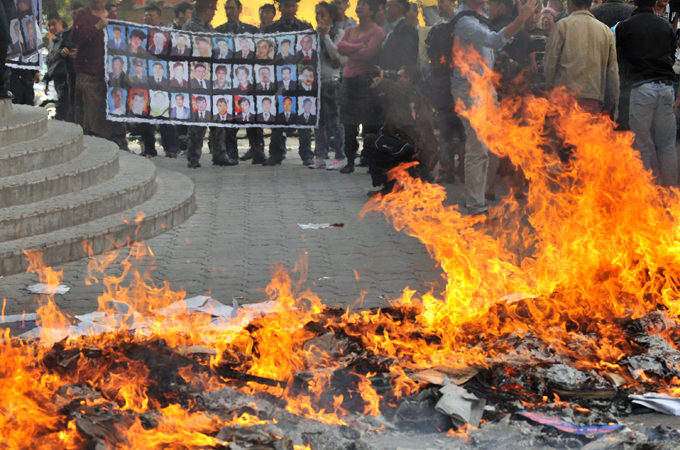Kyrgyz storm political party HQ
Tensions rise ahead of Sunday’s election as protesters demand party linked to ousted president is barred from ballot.

 |
| Protesters demanded that the Ata-Zhurt political party be removed from ballots ahead of Sunday’s election [AFP] |
A group of protesters has stormed the headquarters of a leading political party in Bishkek, the capital of Kyrgyzstan, just days ahead of parliamentary elections.
The protesters seized the building of the nationalist Ata-Zhurt party on Wednesday and demanded that the party be removed from the ballot to be held on Sunday.
Ata-Zhurt includes several representatives of the government under Kurmanbek Bakiyev, the former president, who was toppled during bloody street protests in April.
The countries interim leaders hope that Sunday’s election will help unite the country, but opponents fear that it could trigger more violence and leave the south vulnerable.
‘Explosive situation’
“The situation is highly explosive – powerful nationalist forces in the Kyrgyz society and establishment spare no effort to hold Uzbeks responsible for June’s bloodshed, which sparks strong anger among the latter,” Alexander Knyazev, a senior researcher at the Moscow Institute of Oriental Studies, said.
“The conflict has not been resolved. It has become latent.”
The violence that broke out between ethnic Kyrgyz and Uzbeks in the south of the country in June left at least 400 people dead and thousands homeless.
People identifying themselves as relatives of those killed in the ethnic unrest, on Wednesday said that former Bakiyev officials should be held accountable for the deaths of people killed by government troops.
The election is intended to create Central Asia’s first parliamentary democracy, where the prime minister will have more power than the president.
But opponents say parliamentary rule could leave the former Soviet republic prone to further violence as rival factions battle for power.
Zarylbek Rysaliyev, Kyrgyz interior minister, said on Monday he knew of about 10 “areas of potential clashes” in the country, “with some hotheads planning to snatch ballot boxes”.
The Organisation for Security and Co-operation in Europe, which has deployed 22 long-term observers around the country and expects another 300 monitors for election day, said the security situation was tense, particularly in the south, which may deter ethnic Uzbeks from casting their ballots.
Adil Mukashev, an independent analyst based in Almaty, Kazahkstan, said the success of the elections would face its toughest test in the aftermath, when the losers may challenge the results in the courthouses and the streets.
“If certain people know they will lose their high-ranking posts after the election, then it’s in their interest to destabilise the situation,” he said.
“They could take steps to remain in power or create chaos.”
Party lists
Kyrgyzstan’s electorate of about 2.8 million people will choose from 29 political parties battling over 120 parliament seats, and all voting will be for party lists, not individual candidates.
Omurbek Tekebayev, the leader of opposition party Ata-Meken, was the architect of the constitutional reforms that made the election possible and wil lead his party’s list.
Among his main rivals is Almazbek Atambayev, interim president Roza Otunbayeva’s deputy in the immediate aftermath of the April revolt.
Atambayev has recently travelled to Moscow and met Vladimir Putin, the Russian prime minister, in September.
But Russia may be backing another candidate: Felix Kulov, once a prime minister under Bakiyev. Kilov last month visited Dmitry Medvedev, the Russian president, at his residence near Moscow.
Kulov’s pledge to reverse the constitutional reforms chimes with Medvedev’s concerns that a parliamentary democracy would create factionalism and open the door for a power grab by extremist groups.
Washington on the other hand has vocally embraced the interim government’s plan to create a parliamentary democracy.
Such differences over the future of Kyrgyzstan, where the both the US and Russia have air bases, could jeopardise fragile co-operation over nearby Afghanistan.
Both the Kremlin and White House say that they hope Sunday’s elections will bring stability after six months of upheaval.